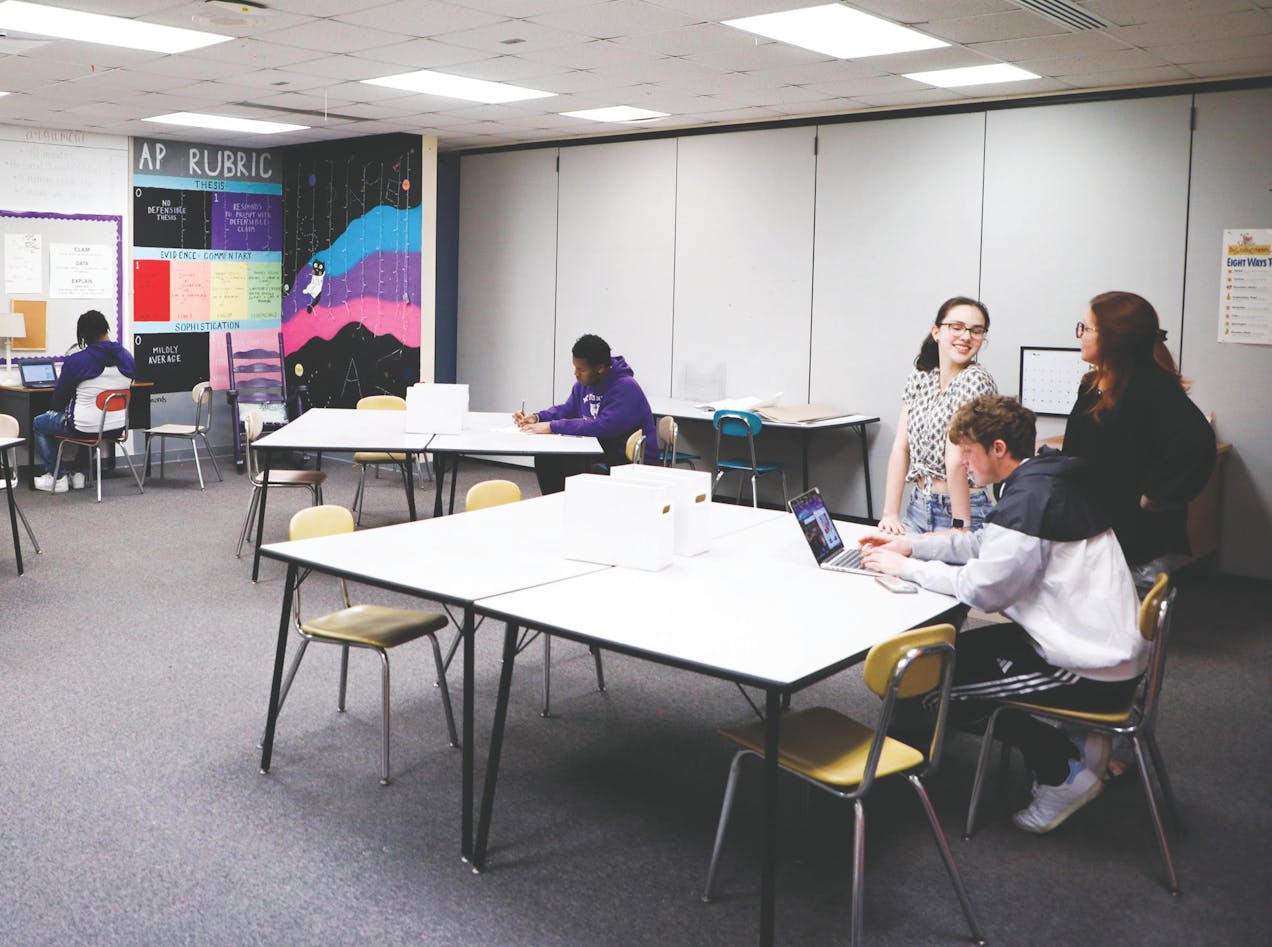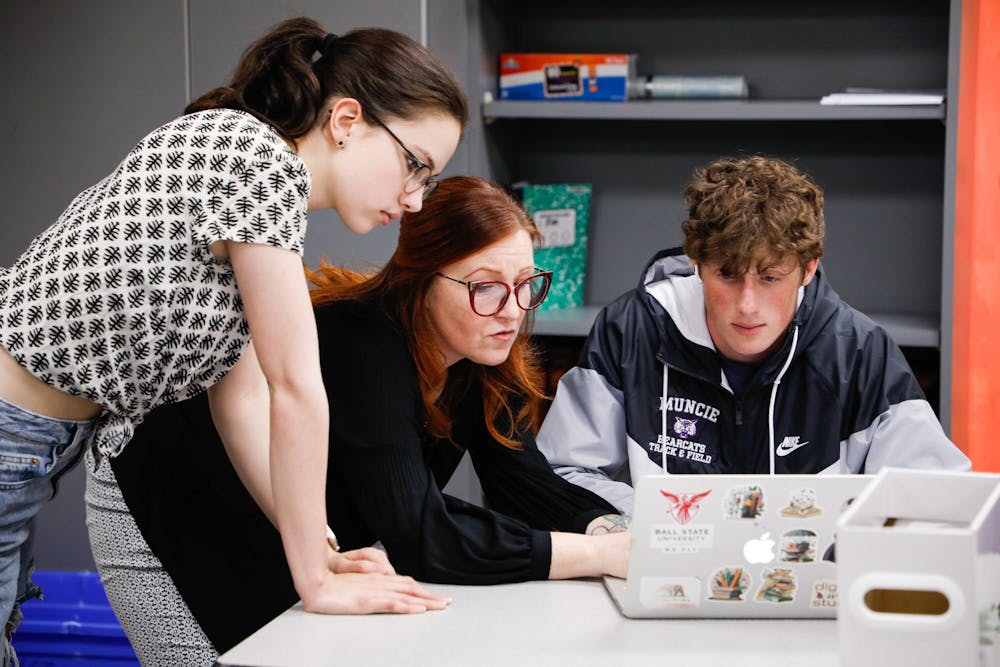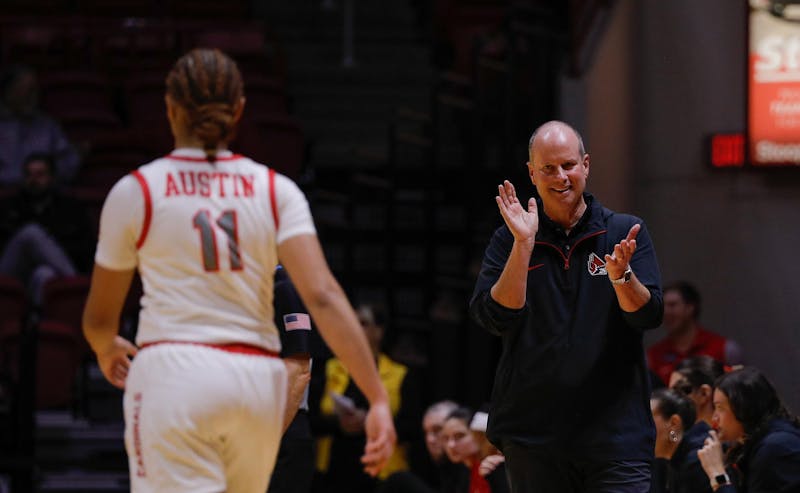Muncie Central High School is now home to the district’s first writing center, a fully functional space that mimics writing centers at the collegiate level, including those found on Ball State’s own campus.
Morgan Leckie, an 11th-grade English teacher at Muncie Central, has lived in the Muncie community for nearly a decade and has two children who attend Muncie Community Schools.
Due to this close connection, she wanted to do something to help support Muncie Community Schools (MCS) outside of her current position.
“I came to Muncie Central eager to work for our public schools here in Muncie,” she said. “ I noticed that our public schools don't have enough support.”

Writing center director Morgan Leckie poses for a photo in front of the space cat wall April 9 at Muncie Central High School. Leckie hopes to provide adequate education resources to help fight generational poverty. Andrew Berger, DN
Leckie is now the director of the school’s writing center. She is also a former Ball State University English professor. Last year was her first time teaching 11th grade. During the transition from teaching collegiate-level to high school students,
“I didn't see that we had struggling writers. [Students] were just unpracticed and reluctant,” Leckie said.
Andy Klotz, MCS Chief Communications Officer, said this attitude is called scriptophobia, “the fear of writing something that will be read by others or graded by a teacher.”
“This kind of reluctance to write goes well beyond not knowing where to start a paper or being unsure of how best to structure ideas,” Klotz said in a press release. “It’s a visceral reaction, much like the more common fear of public speaking.”
In a world of scripted social media posts and photo captions, writing is not as avoidable as public speaking.
“Writing is something a lot of us are doing anyway,” Leckie said.
An assistant teaching professor at Ball State, Kat Greene, emphasized in her first-year writing classes that being able to give and receive feedback on writing is a necessary skill for any career path.

Two students share their work in the writing center April 9 at Muncie Central High School. The writing center hopes to improve students' chances of reaching college-level writing skills. Andrew Berger, DN
The education curriculum at the collegiate and K-12 levels underwent significant changes during the COVID-19 pandemic. No face-to-face exchange between teachers and students meant completion of an assignment was valued more than accuracy across the board.
“COVID was absolutely detrimental because [teachers and students] started to commoditize the exchanges of education,” Leckie said.
The so-called “jumping through hoops” to complete a task or assignment created a breeding ground for technology advancements like ChatGPT, an Artificial Intelligence (AI) chatbot, to thrive.
Leckie was an educator during the pandemic, so she made it clear not to criticize teachers.
“I think the literacy skills for the students I meet don't have the same foundations as students who didn't go through something like a global pandemic,” she said.
The work from her students carries an organic quality AI cannot replicate, something she reminds students of to increase their literary competence. She argued ChatGPT could fit into the education system but with parameters. She said such technology advancements should be used to assist one’s knowledge, rather than be relied heavily upon as a crutch.
Greene admitted that certain technology advancements are fun to use, but academically, there are no shortcuts to critical thinking. Academic writing has its own set of constraints, which she said she knows can be difficult to hone.
“One of the goals of the writing center is to promote writing,” Greene said.
She said she found that her students like to write — and often do so prolifically — but the specifics of academic writing present them with challenges.

Leckie understood this when stepping into the role of writing center director. She said her priority is to help kids grow with writing in a way that “actually serves them” and to be better at understanding the world around them.”
Those at the center cannot provide these opportunities without significant financial planning to ensure its stability.
Greene, who is the project director for the collaboration that saw Muncie Central’s writing center come to fruition, said the center is funded through the Indiana Department of Education’s Learning Recovery Grant, a grant heavily written by her predecessor, Jackie Grutsch McKinney.
“The grant, in total, is about $3 Million … The collaboration between Ball State and local writing centers is only a small part of that,” Greene said.
There are five school renovation projects across Muncie that the grant has funded since the fall of 2022. The writing center project at Muncie Central began in the fall of 2023 after Burris Laboratory School acted as a successful “pilot program.”
“It's early for [MCS], but we're excited,” she said. “A lot of things really helped us create this partnership that I don't know other schools or communities have as readily available to them as we did.”
Leckie said a supportive, involved administration is “key” to the success of any time-intensive, costly undertaking. Lasting success from the writing center is something Leckie and Greene both are looking for in the years to come.
“My hope is that in the next five years, we can continue to do work in such a way that impacts this community by sending a lot of [Muncie] Central kids to college,” Leckie said.
The abilities to read comprehensively and write effectively enable one to communicate efficiently. Leckie, who taught her older brother how to read when she graduated college, knows firsthand that having adequate education resources available breaks generational poverty.
“Writing well and literacy are some things I always want other people to be empowered through because they changed my life,” she said.
Contact Katherine Hill with comments at katherine.hill@bsu.edu .





The Daily News welcomes thoughtful discussion on all of our stories, but please keep comments civil and on-topic. Read our full guidelines here.